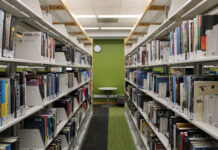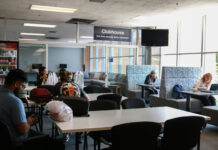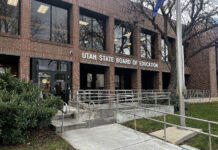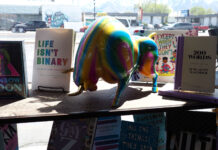
Free speech is under debate. A bastion of free speech has often been libraries, and this is no truer than at Salt Lake Community College.
Although SLCC libraries do not have a list of books or magazines they will not carry, the policy is currently being updated.

The new policy is expected to closely resemble the Library Bill of Rights, put out by the American Library Association. The library’s present criterion for what books are on the shelves is based on their academic value, not on any message the work may express.
“If somebody brings something in that’s controversial … we won’t necessarily be judging it on ‘We don’t like what that says’… it will be … ‘Does this meet the needs of the college, and what students are studying in the courses?’ So that guides us more than [the material],” says library services director Jon Glenn, “but we take every request into consideration.”
Materials of an explicit pornographic nature are, of course, not allowed in the library; but books with nudity or profanity are not immediately ruled out.
“We’re not a school library, we’re not a public library,” Glenn explains. “We’re an academic library aimed at college students.”

SLCC students studying human anatomy or the fine arts may need books with nudity, and books with explicit language could apply to a number of subjects.
Internet access is another area where this policy is used.
The library computer labs, though technically a separate entity from the libraries themselves, do not have any filters; blatant pornography is not allowed, as that violates the student code of conduct. Using SLCC computers to run a personal business is also not allowed. Anything else is fair game.
A similar policy is used with library exhibits.
“It’s just like the books,” Glenn says. “What’s its academic merit to the college?” Exhibits the library feels are more propaganda than educational may also be rejected.
One SLCC student, when asked, says they understand the policy, indicating, “This is an academic library.”

Any student that finds a library resource offensive can make a complaint by filling out a “Statement of Concern” form and library staff will review the work. As of yet, no resource has been removed because of the form.
The only instance of a book’s status being changed was a case of falsehood. When James Frey’s “A Million Little Pieces” — which had been publicized on Oprah — was found to be untrue, the book was changed from non-fiction to fiction and is still available.
At one time, certain books were kept in a locked room and had to be requested, but this is no longer done. In terms of censorship, Glenn says, that practice “does create an issue.”
As of now, every resource the library has is out in the open and available for use by all students.






